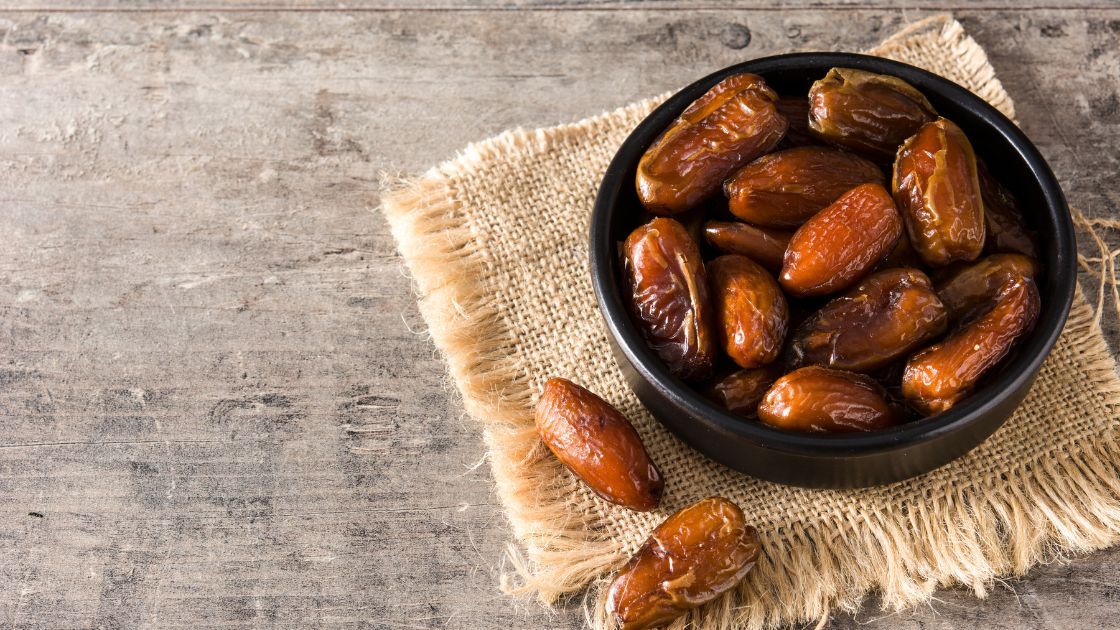- They are a healthy snack option that is rich in vitamins and minerals
- They can be incorporated into an alkaline diet for added health benefits
- They are grown all over the world and are used in various dishes
- They are high in dietary fiber, potassium, vitamin B6, and magnesium
- Eating them in moderation can aid in weight loss, blood sugar control, inflammation reduction, and improved gut health
If you’re looking for a sweet-snack addition to your diet that also packs a health punch, dates are a great option.
Medjool dates, pitted, fresh, or dried dates – it doesn’t matter – these delectable dates are rich in vitamins and minerals.
Did you know, for instance, that only a handful of dried fruit can help promote everything from heart health to bone health and everything in between?
In this blog post, we’ll discuss the many health benefits of dates and how they can be incorporated into your alkaline diet.
From weight loss to improved cognitive function, dates are also a powerhouse fruit that can help you achieve your health goals.
So, dates are a great choice whether you’re following an alkaline diet or want to add some healthy sweetness to your life.
Physical Description
Dates are part of the palm family.
They come in two different shapes – bunches (or clusters) and spheres.
You will notice that dates are soft to the touch and have a sweet, fruity flavor. You can eat dates either fresh or dried.
When they are dried, they will become hard and wrinkly, like raisins.
You can eat fresh dates all year round to receive nutrients that fit perfectly well with your alkaline diet.
Or just add a healthy snack to your day.
Mature dates have reached their peak flavor and texture and are usually firm but not too hard, with a sweet taste, smooth texture, and brown color.
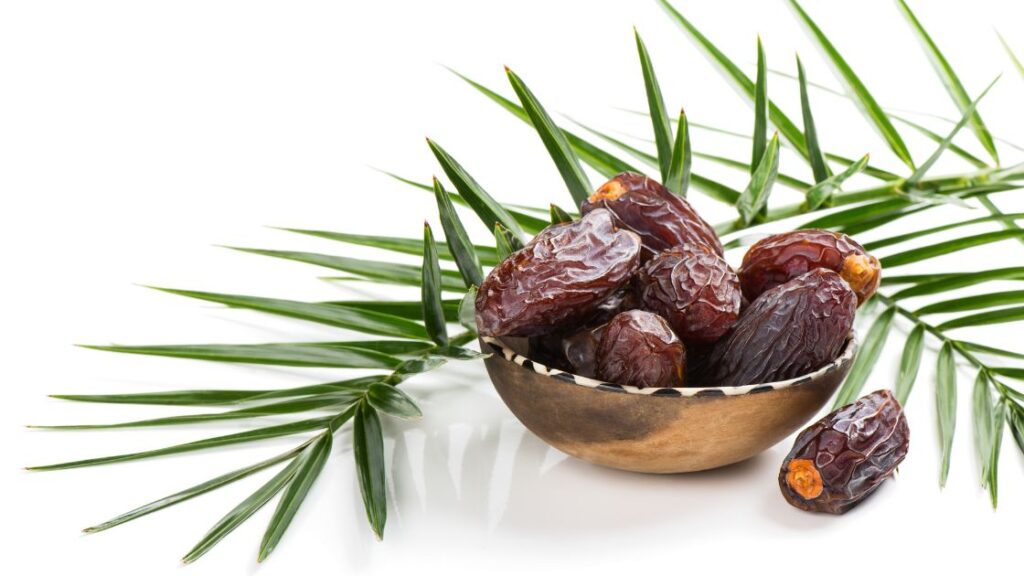
Ripe dates are soft and pliable, with a slightly sour taste and a thick consistency, so this is a good option if you are fond of the taste without the sweetness.
You will also notice some ripe dates have reddish patches on them due to oxidation (a process where sugar molecules bind together).
As ripe dates start to decompose, you will notice yellow or black colors start developing.
This usually happens within two weeks after being harvested.
History and Production
Dates are grown all over the world.
They’re trendy in the Middle East and North Africa, where they’re used in various dishes.
Production typically starts with selecting the right tree species – those that are hardy and produce large quantities of fruit.
Once the trees have been selected, workers begin by removing the lower branches so that the fruit is more easily accessible.
After the harvest, they wash it to remove any surface dirt or pesticides.
After that, workers dry it out in the sun or in ovens until it becomes hard enough to be stored or sold.
Date-bearing palm trees require well-draining soil and plenty of sunlight to flourish.
They can also be grown indoors under artificial light if necessary.
The fruit itself is composed of two layers: an outer layer that is rich in nutrients, and an inner layer that contains sweet yumminess.
Dates are typically dried for several weeks or months before they are sold, although some fruits may be dehydrated for only a few hours.
What Is the pH Scale?
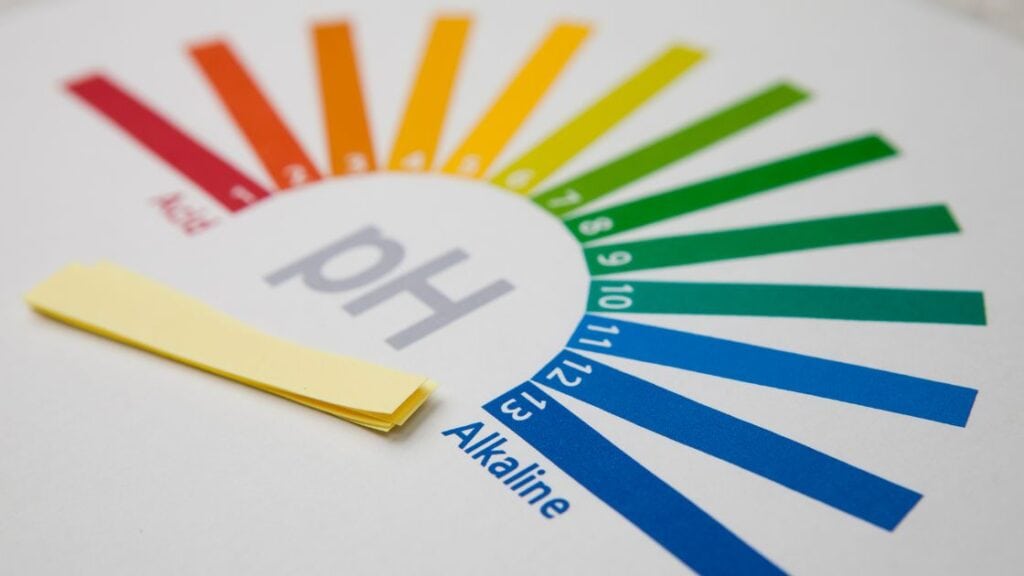
You might have noticed that we mentioned that dates provide the right nutrients for an alkaline diet.
So, the pH scale is worth mentioning here.
It is a measure of the acidity or alkalinity of a product. You can use the scale to determine its effect on your health.
It ranges from 0 to 14, with 7 as neutral in the middle.
An alkaline diet requires consuming foods with a pH value of 6+.
You must remember that, although some alkaline foods such as dates might be below the figure, it is still considered safe for your low pH diet.
These fruits are still not acidic due to their alkalizing effect on your body.
An alkaline diet is a lifestyle that aims to maintain the pH balance in your body by consuming foods that are high in potassium and low in acid.
The goal is to restore your body’s natural pH levels, which can help to improve your overall health and well-being.
There are a few things to keep in mind when following an alkaline diet:
- It’s important that you pay attention to the amount of acidity your body is carrying around. This can be measured using the pH meter, which you can buy online or at some pharmacies.
- It’s also important that you avoid eating too many processed foods and sugary drinks, as they contain high levels of acidity. Instead, stick to fresh fruits and vegetables, whole grains, legumes, and low-fat dairy products.
- Make sure you’re getting enough potassium in your diet – this mineral helps maintain blood pressure levels and keep your cells functioning properly. Some good sources of potassium include leafy greens, nuts, and seeds.
Nutritional Facts About Dates
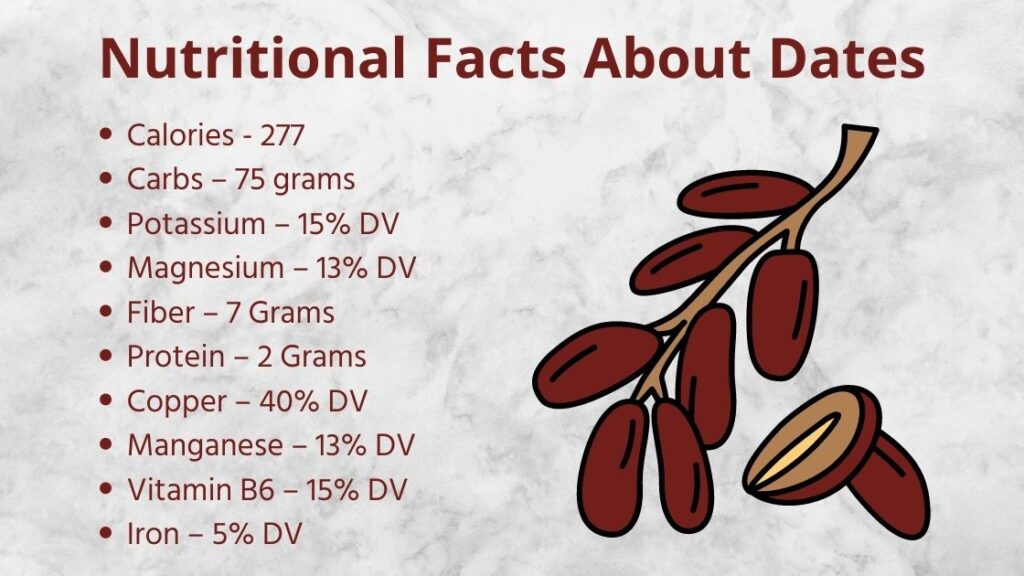
Dates are high in dietary fiber, which is fabulous for your digestive health and helps keep you full for longer.
They’re also an excellent source of potassium, vitamin B6, and magnesium.
In addition, dates are a good source of antioxidants, including vitamins C and E, which will provide energy while fighting off free radicals.
Since they’re high in calories and sugar (63 grams per 100 grams), limit your intake to only three or four per day!
Remember to include them in a healthy diet that includes other plant-based foods, plenty of water, and exercise!
Dates have a low glycemic index.
Detailed Nutritional Values
- Calories – 277
- Carbs – 75 grams
- Potassium – 15% DV
- Magnesium – 13% DV
- Fiber – 7 Grams
- Protein – 2 Grams
- Copper – 40% DV
- Manganese – 13% DV
- Vitamin B6 – 15% DV
- Iron – 5% DV
Health Benefits of Dates
There are numerous proven health benefits of dates, especially if you eat them in moderation in an alkaline diet.
Some of the perks include weight loss, improved blood sugar control, reduced inflammation, and so much more.
Dates also contain antioxidants, which can help reduce the risk of cancer and heart disease.
Dates are one of the few natural sources of antioxidants that are high in polyphenols – beneficial compounds that can have an anti-inflammatory effect on your health.
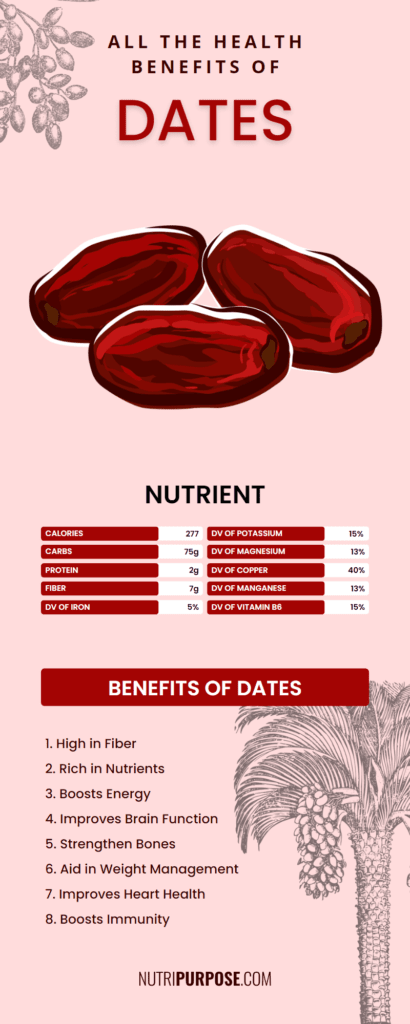
How often should you eat dates?
Typically, two to four dates a day will be enough for you to get the benefits outlined below.
List Benefits
Here are four reasons why dates should be part of your daily routine:
- Weight Loss – Date palm trees produce abundant fruit throughout the year. In fact, they provide all the nutrients (including fiber) needed to support weight loss goals while also promoting healthy digestion and gut health. As long as you snack in moderation.
- Blood Sugar Control – the fruit is high in both fructose and glucose- making it a great option for people with diabetes or metabolic syndrome who need to maintain consistent blood sugar levels.
- Inflammation Reduction – Like other fruits and vegetables rich in antioxidants, dates contain several phytonutrients that help reduce inflammation.
- Improved Gut Health -Eating lots of probiotics and prebiotic starches such as onions will promote good gut bacteria growth, enhancing overall digestive function.
Dates Recipes:
Adding dates to your alkaline-safe recipes can help to make them even more nutritious and tasty.
Dates are a natural source of sugar, which provides us with energy and helps to keep us feeling full.
Date and Walnut Loaf

This delicious recipe combines the flavor of dates with walnuts.
The loaf is moist, fluffy, and sweet – just like a traditional bread loaf should be!
It’s perfect for any occasion and can easily be made in advance, so you have everything you need when guests arrive.
Ingredients:
- 1 1/2 cups all-purpose flour
- 1 teaspoon baking powder
- pinch of salt
- 13 tablespoons unsalted butter (at room temperature)
- 3/4 cup granulated sugar divided (use between the batter and the glaze)
- 3 large eggs beaten until they form stiff peaks.
- 2 teaspoons light corn syrup or glucose mixed with 1 tablespoon water.
Instructions:
Preheat oven to 350 degrees F (175 degrees C).
Grease an 8×8-inch loaf pan with butter.
Whisk together dry ingredients, including 1/2 cup sugar, in a medium bowl, and set aside for later.
Add wet ingredients, making sure not to overmix – stir until everything seems combined but not too lumpy.
Fold in the date mixture gently using a spoon or your hands without breaking up the dates.
Pour batter into the prepared loaf pan. Bake for 50 minutes or until golden brown on top. Let cool slightly before serving.
Date Pudding

Date pudding is a sweet and creamy dessert that will melt in your mouth.
It’s also an excellent option if you’re following an alkaline diet, as it contains few carbohydrates and no added sugar.
Several variations of date pudding are available online, but this simple recipe is easy to follow and yields great results for your alkaline and high-pH diet.
Ingredients:
- 1 cup unsweetened almond milk or regular milk
- 3/4 cup pitted dates, soaked in water for at least 30 minutes (or until soft)
- 2 tablespoons cocoa powder
- 1 teaspoon baking soda
- pinch of salt
Instructions:
Preheat oven to 375 degrees F (190 degrees C).
Grease an 8×8-inch baking dish with butter or cooking spray.
Soak wooden skewers in cold water for about 10 minutes before using them to help prevent sticking during baking.
Alternatively, use toothpicks to poke holes all over the top of the date pudding batter so air can escape while it bakes.
In a blender or food processor fitted with a dough blade, blend dates, almond milk (or regular milk), cocoa powder, baking soda (powder dissolved in warm water), and salt until smoothie-like consistency is reached.
Pour date pudding batter into the prepared pan; spread evenly with the back of a spoon or spatula.
Have a Date High in Fiber!
As we’ve illustrated, eating dates (in moderation) is like dating yourself – you are caring for yourself and looking after yourself, with just a dash of sweetness to keep you smiling.
Some of the health benefits include boosting cardiovascular and brain health, reducing the risk of type 2 diabetes, and providing you with a healthy weight.
Adding dates to your alkaline diet can help you enjoy these benefits even more.
You should, however, consider that dates should always be consumed in moderation, whether following an alkaline diet or not.
Too much sugar in a diet can have dire consequences for your health.

I am a professional health and nutrition writer with extensive experience in the industry. My passion for sharing valuable insights on nutrition and wellness stems from over 15 years of personal training and maintaining a healthy lifestyle. My commitment to continuously educate myself on the latest trends and research in the field allows me to deliver high-quality content that is informative and engaging. My mission is to empower individuals to make informed decisions about their health and well-being through my writing.
